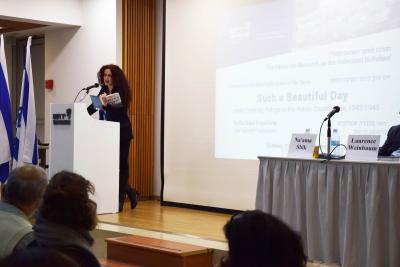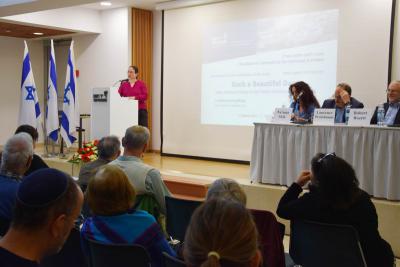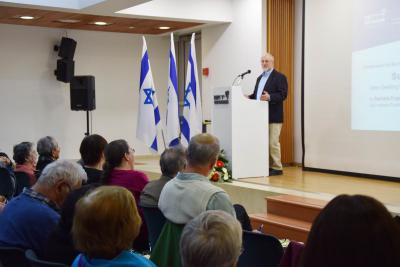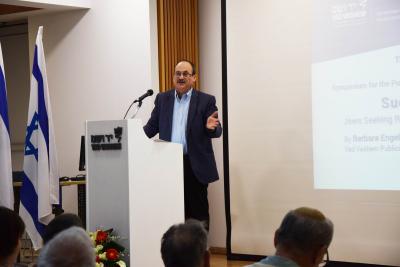
Dr. Na'ama Shik, Director of Yad Vashem's International School for Holocaust Studies' e-Learning Department, moderated the symposium

Prof. Havi Dreifuss, Director of Yad Vashem's Center for Research of the Holocaust in Poland, praised Prof. Engelking's efforts to "give a voice both to the survivors and to those who were murdered."

Director of the Yad Vashem Libraries Dr. Robert Rozett examined cases of betrayal and murder across wartime Europe by persecutors who knew their victims
15 March 2017
On Wednesday, 15 March 2017, the Center for Research on the Holocaust in Poland at Yad Vashem's International Institute for Holocaust Research held a symposium marking the publication of the new Yad Vashem book, Such a Beautiful Sunny Day by Prof. Barbara Engelking, Director of the Polish Center for Holocaust Research in Warsaw. This groundbreaking study follows in the footsteps of Prof. Jan Tomasz Gross (whose 2016 David Bankier Annual Lecture is soon to be published by Yad Vashem) and Prof. Jan Grabowski (whose book Hunt for the Jews was recently published in Hebrew by Yad Vashem). Over the past two decades, these pioneering Polish researchers have revealed the documented complicity of large numbers of Polish citizens in the murder of their Jewish neighbors during the Holocaust. Prof. Engelking's book sheds further light on a hitherto undocumented aspect of the Holocaust in Poland: Jews seeking refuge in the Polish countryside during the years 1942-1945.
Prof. Havi Dreifuss, Director of Yad Vashem's Center for Research on the Holocaust in Poland, opened the symposium by explaining that the book was first published in Polish six years ago and is now, with Yad Vashem's assistance, available to English-speaking audiences. Prof. Dreifuss called the book "breathtaking… although the content is many times unbearable." Until now, she explained, the Holocaust in Poland has been mainly associated with the ghettos and with the "anonymous mass murders" in death camps, especially Auschwitz-Birkenau. "Such a Beautiful Sunny Day reminds us that the Holocaust was not just about the destruction of Jewish communities but also a story of individual Jews seeking refuge, often in the countryside, and often among people they knew. Most importantly, through testimonies and diaries, Prof. Engelking is determined to give a voice both to the survivors and to those who were murdered."
Director of the Yad Vashem Libraries Dr. Robert Rozett expanded upon the topic of "intimate murder," wherein the victims know their persecutors, and vice versa. He provided an array of examples in history and across wartime Europe in which people not only turned against their former classmates, teachers, neighbors and colleagues, but did so with unprecedented cruelty and barbarism. "The section of Engelking's book entitled 'The Doomed' reads like a litany of betrayal," he said. "Eye-level murder is even harder to comprehend than anonymous killings."
"We will never know exactly what led rural Poles to denounce and murder Jews seeking refuge in their area," noted Prof. Engelking. "In the book I surmise that it was a mixture of external factors, for example wartime demoralization and social pressure, as well as internal factors, such as greed, hatred, antisemitism and the fear of collective punishment by the Germans. Of course, one needs to look at each incident on a case-by-case basis, and none of them are clear cut, but all of these elements can be found in rural Poland. Thus, those Poles who did offer shelter to the persecuted Jews did so in an atmosphere laden with anti-Jewish sentiment and fear of reprisal."
"One of the great achievements of this book is its multidisciplinary nature," said Yad Vashem Academic Advisor Prof. Yehuda Bauer – a world-renowned scholar of the Holocaust. "Engelking not only employs a sound historical narrative, but she also integrates elements of social psychology… The local populations didn't view the Jews as Poles, but something else, a danger to Polish society. This, together with other factors, such as the volatile economic and political situation in Europe in the 1920s and '30s, as well as deep-rooted Christian antisemitism, may be what led to their willing participation in the murder of the Jews in their vicinity."
Dr. Laurence Weinbaum, Director General of the World Jewish Congress Israel called Prof. Engelking "one of the great pioneers of Shoah research in Poland." Using a vast array of testimony and court records, the book, he claimed, is "a monument to the nameless victims." He noted, too, that the book echoes Prof. Grabowski's supplementing - to the three previously defined groups of people during the Holocaust – victims, persecutors and bystanders – a fourth group: "enablers and facilitators," who viewed the Jews as no less than a commodity to be traded, and murdered, at will.
Yad Vashem Chief Historian Prof. Dina Porat presented and analyzed the reasons for the desire of some Jews to take revenge on the Germans after the war. Whether from the wish to fulfil the last requests of the victims, or from wanting to demonstrate to potential persecutors that the Jews "were a force to be reckoned with," Prof. Porat noted that for some survivors, "the war may have ended in 1945 but the Shoah did not."
Also addressing the audience was Natalie Beige, a doctoral student at Tel Aviv University, who compared the Holocaust in the Lithuanian provinces to the experience of Jews in the Polish countryside. "This was a golden opportunity for rural Lithuanians to enrich themselves at the expense of the Jews," she said. "The Germans could not have carried out the destruction of the Jewish population in rural communities without the help and collaboration of the local population."
The event ended with an incisive roundtable discussion moderated by Dr. David Silberklang, Senior Historian at the International Institute for Holocaust Research. Prof. Engelking, Prof. Dreifuss and Prof. Yehuda Bauer took part in the discussion, which focused on a number of related topics, including: the motives of local Poles to denounce and murder Jews who sought refuge in rural areas; the differences in experience of the Jews in the cities and the countryside, as well as in different regions of Poland; the attitude towards the Jews by varying populations; the role of public officials, such as the "Blue Police," in the betrayal of Jews; and the manner in which the Jewish refugees viewed the events and players at different stages of the war. The discussion concluded with a look at the "anti-liberalistic" trends in many – albeit democratic – regimes worldwide, including Poland, and the hope that honest, sincere and comprehensive research such as that carried out by Prof. Engelking and her colleagues will continue to provide a clear and more balanced understanding of the events of the Holocaust in years to come.







